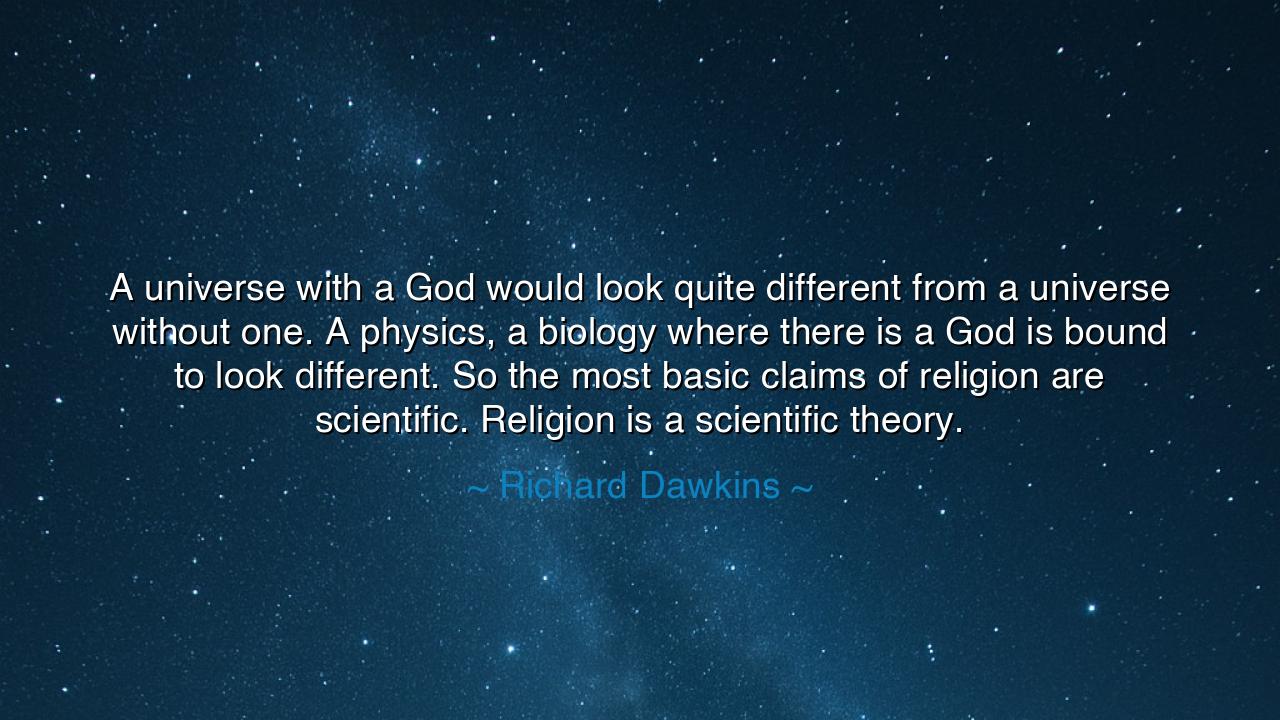
A universe with a God would look quite different from a universe
A universe with a God would look quite different from a universe without one. A physics, a biology where there is a God is bound to look different. So the most basic claims of religion are scientific. Religion is a scientific theory.






Hear, O child of reason and wonder, the striking words of Richard Dawkins: “A universe with a God would look quite different from a universe without one. A physics, a biology where there is a God is bound to look different. So the most basic claims of religion are scientific. Religion is a scientific theory.” These words come not as a prayer, but as a challenge, for Dawkins, the warrior of Darwin’s cause, seeks to turn the gaze of religion from mystery to evidence, from faith to inquiry. In his voice we hear the clash of worlds: the world of the believer and the world of the skeptic, yet both bound by the same desire—to know the truth of existence.
Consider the first claim: “A universe with a God would look quite different from a universe without one.” This is the language of science, where hypotheses are tested by their fruits. If God were the architect, then the fabric of reality would carry his fingerprints—in miracles, in laws written beyond nature, in signs unmistakable. If there were no God, then all would flow from natural forces alone, blind yet sufficient to shape galaxies, trees, and minds. Thus Dawkins calls upon us: if such a difference exists, then the question of God is not beyond examination but within it.
Reflect upon his next words: “The most basic claims of religion are scientific.” By this he means that religions do not only speak of morals or mysteries, but of the nature of reality itself: that the heavens were created by design, that souls survive death, that prayers move the world. These are not vague feelings, but concrete claims about the way the universe works. And if such claims touch the fabric of physics and biology, then they may be weighed, tested, confirmed, or denied, just as any other theory may be. In this, Dawkins seeks to strip away the aura of untouchability that religion often places around itself.
History gives us examples of this confrontation. In the days of Galileo, the church declared that the earth stood at the center of creation, a claim not only theological but scientific in nature. Yet the telescope showed otherwise, and the heavens revealed a greater vastness than men had imagined. Here was Dawkins’s principle at work: when religion makes claims about the natural world, it enters the realm of science, and must endure the test of evidence.
And yet, there is a paradox. For many, religion is not simply theory but story, symbol, and song. It is the poetry of the heart, not only the map of the cosmos. To treat it only as scientific theory is to risk missing its deeper purpose: to inspire, to console, to bind communities in meaning. But Dawkins’s challenge remains: when religion speaks of what is, of what happens, of what exists, it speaks in the same tongue as science, and must be judged by the same laws of truth.
The meaning, then, is twofold. First, Dawkins unmasks the scientific nature of religious claims: they are not immune from inquiry. Second, he invites humanity to a deeper courage: to test what we believe, not to shrink from the light of evidence, but to let truth, wherever it lies, be our compass. For if God exists, evidence will reveal him; and if God does not, then reality itself is sacred in its majesty. Either way, inquiry leads us closer to wisdom.
The lesson for us is clear: live neither in blind faith nor in blind denial, but in courageous seeking. Do not fear to question the heavens, nor to examine the scriptures. Let science and reason be your tools, but let wonder and humility be your guides. For truth is not the enemy of faith, nor of reason, but the reward of those who dare to ask. Religion as theory, science as method, humanity as seeker—this is the path of enlightenment.
Practical counsel follows. Read widely, in science and in faith, so that your mind is not narrow. When confronted with claims—whether miraculous or mundane—ask: what would the world look like if this were true? Seek evidence, but also seek meaning. And above all, hold fast to honesty, for only in truth does the soul find rest.
Therefore, O child of both dust and stars, remember Dawkins’s challenge: religion makes scientific claims, and as such, it must face the test of reality. Do not shrink from this test. For whether God dwells in the heavens or not, the pursuit of truth will awaken your spirit, and your journey will become not only a search for answers, but a witness to the grandeur of existence itself.






AAdministratorAdministrator
Welcome, honored guests. Please leave a comment, we will respond soon